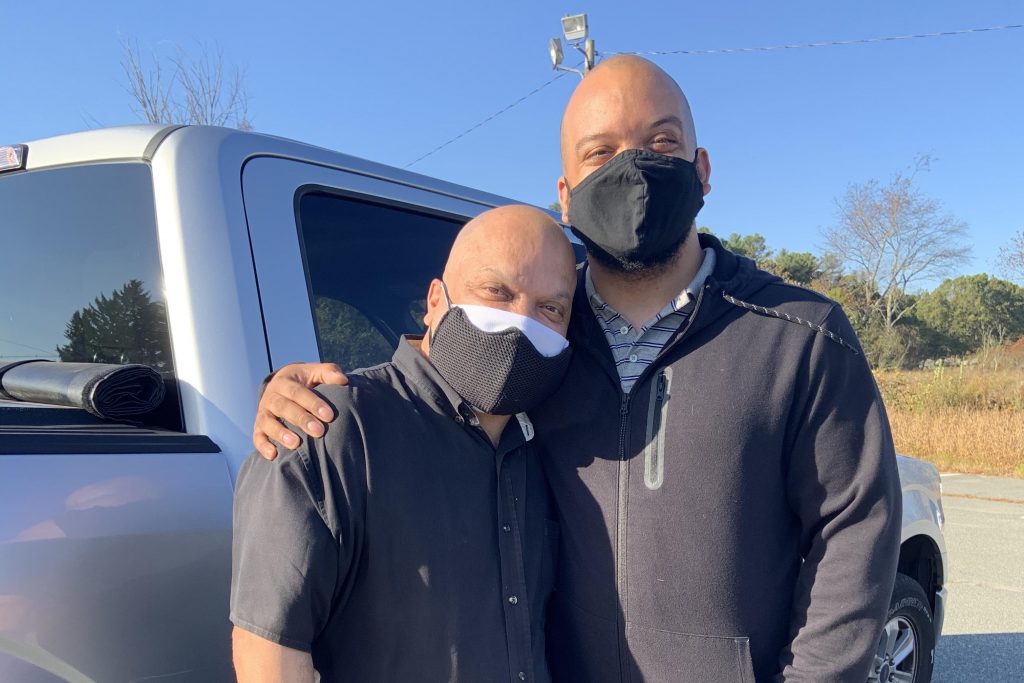Boston College Innocence Program (BCIP) client Thomas Rosa, Jr., of Chelsea (above, left, with his son Emmanuel), was freed from prison and reunited with his loved ones on October 15, after serving 34 years for a crime he did not commit. Rosa is the third BCIP client released from a wrongful life without parole sentence this year. BCIP clients Ronnie Qualls and Frances Choy were released this spring and exonerated in September.
BCIP represents Rosa in partnership with the New England Innocence Project (NEIP).
Rosa, who has always maintained his innocence, was wrongfully convicted in Suffolk County Superior Court of the 1985 kidnapping and murder of Gwendolyn Taylor in Boston. He was tried three times. His first trial ended in a mistrial when jurors could not agree on a verdict. His convictions following a second trial were reversed by the Supreme Judicial Court. BCIP Supervising Attorney Charlotte Whitmore and BCIP students joined NEIP Executive Director Radha Natarajan as co-counsel for Rosa in 2017.
Kayleigh McGlynn ’19, now an associate at Fish & Richardson, P.C., was assigned to work on Rosa’s case as a 2L in the BC Innocence Clinic. McGlynn majored in biology as a BC undergraduate and had experience in DNA testing from her work as a research scientist prior to entering law school.
When poring over the complicated DNA testing documents, McGlynn found a discrepancy that none of Rosa’s prior attorneys had recognized. This discrepancy led to further investigation by a DNA expert. Little did McGlynn know how important her discovery would be in securing Rosa’s freedom.
In June, BCIP and NEIP filed a motion for post-conviction relief and a motion for stay of execution of sentence on behalf of Rosa based on the new DNA evidence and on scientific evidence undermining eyewitness identification testimony in the case. The motion to stay Rosa’s sentence pending litigation of his motion for post-conviction relief argued that Rosa’s motion for postconviction relief has merit, he presents no danger to the public, and his age and underlying health conditions put him at risk of death or serious injury if he were to contract Covid-19 in prison.
Suffolk County District Attorney Rachel Rollins filed a response agreeing to Rosa’s release. When the Superior Court did not rule on the motion, the Commonwealth filed a petition with the Single Justice of the Supreme Judicial Court asking that court to grant the stay. BCIP and NEIP filed additional briefing seeking this result on behalf of Rosa.
On October 14, Supreme Judicial Court Justice Frank Gaziano granted the motion to release Rosa pending further litigation of his motion for postconviction relief. The new DNA evidence was central to Justice Gaziano’s ruling. He wrote that “the DNA evidence, if correct, in conjunction with the defendant’s other claims, could well establish that ‘confluence of factors’ that would indicate that a new trial is required.”
McGlynn, who was present with Rosa at MCI Norfolk when Boston police detectives collected his buccal swab before she sent it to the lab for DNA testing, was understated about her role:
“I looked at the DNA testing reports in Mr. Rosa’s case simply because I was interested in the testing and wanted to see what work had already been completed,” McGlynn said. “I never thought I would find something that would lead to additional DNA testing or that the DNA testing would ultimately play a role in the judge’s decision to grant a stay of execution of sentence. I am humbled to have had the opportunity to work on Mr. Rosa’s case, and I am so happy to see Mr. Rosa secure his freedom and be reunited with his family.”
Professor Whitmore, who led BCIP’s work on the case stated, “We are thrilled to welcome Mr. Rosa home. Many BCIP students worked tirelessly to help achieve this long-awaited outcome and we are privileged to continue to partner with the New England Innocence Project to pursue justice for Mr. Rosa after so many years of wrongful imprisonment.”
Radha Natarajan, who invited BCIP to join NEIP in representing Rosa, agrees. “We will not stop fighting for Mr. Rosa until this wrongful conviction is overturned.”
In addition to McGlynn, BCIP students Rachel Feit ’19, Harrison Baker ’19, Kerry Collins ’19, and summer legal intern Ye-Eun Sung ’22, and undergrad Sophia Fox ’20 were part of the BCIP legal team that secured Rosa’s release. BCIP alumna Sarah Carlow ’20, who began her two-year post-grad clinical legal fellowship last week, will join Rosa’s legal team.
In the coming months, Rosa’s legal team and the Commonwealth will submit additional briefings. Going forward, Rosa will take small steps to start rebuilding his life after decades of wrongful incarceration. He has significant family and community support as well as the support of BCIP’s interdisciplinary law and social work team.
The Boston College Innocence Program is a clinical legal educational program at Boston College Law School where faculty and students study the causes of wrongful convictions and work to remedy and prevent these injustices. BCIP provides pro bono legal representation to individuals who maintain they were convicted in Massachusetts for crimes they did not commit as well as legal and interdisciplinary research and education on much needed systemic reforms.
More on Rosa’s case: MassLive, CBSlocal.com, Boston Globe.
Read about this year’s previous exonerees, Frances Choy and Ronnie Qualls, in BC Law Magazine.
Update: In a Boston Globe article about the 2022 Innocence Network Conference in Phoenix, AZ, BC Law and Massachusetts were recognized for their leading roles in freeing and supporting the wrongly convicted.
Facebook: @ BCInnocenceProgram Instagram: @bc_innocence Twitter: @bcinnocence


